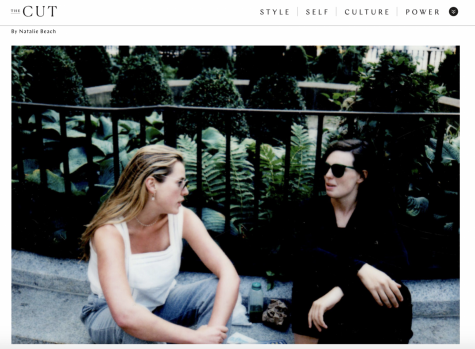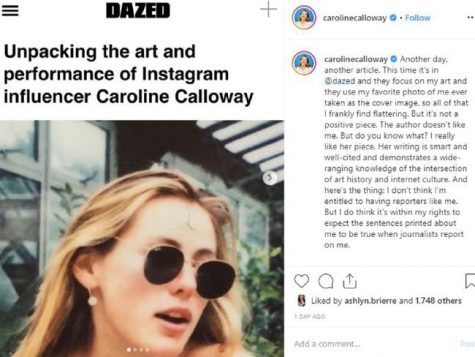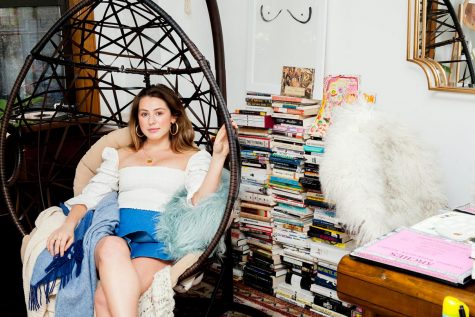Opinion: Caroline Calloway and What the Public Thinks of Influencers
September 23, 2019
On Tuesday, Sep. 10, an article was published on the news site The Cut in which writer Natalie Beach shared her story about being a ghostwriter for Instagram celebrity Caroline Calloway. The internet proceeded to go crazy, invoking a flurry of activity, especially within the writing and journalism communities. In the last two weeks alone, the New York Times has written about Calloway five separate times. But who is Caroline Calloway? And why should we even care?

Caroline Calloway first reached fame online in 2014 by posting photos of her time as an art history student at Cambridge University with long and elegantly written captions describing her adventures. She came back into the public eye this January after being accused of being a scammer when her creative workshops (at $165 a person) seemed to fall apart in a very public way. Natalie Beach was a friend of Calloway’s during their time together at NYU. Calloway claimed to admire Beach’s writing, and asked her to edit her Instagram captions as a paid side gig from 2012-2013.
Beach’s article goes into detail about how the pair met, and how mentally unstable and erratic Calloway, who at this point was developing what would become a serious Adderall addiction, was during her first years at Cambridge. After the duo ended their time writing Instagram captions together, Calloway was granted a book deal based off of her writing. Feeling overwhelmed, Calloway asked Beach to co-write the book proposal with her. Beach slaved away at the proposal without credit, and in the end, Calloway ended up backing out of the $450,000 book deal and breaking her contract with the publisher.
Beach’s article goes on to describe Calloway’s behavior, her disconnect with reality, narcissism, and struggle with addiction. But other than painting a depressing portrait of a struggling individual, Beach’s article doesn’t actually drop any shocking information. The article presents itself more as a personal anecdote than as a shocking journalistic expose, and both women involved have remained complementary of each other and of the writing. Yet, the media latched onto the story as if it were a dramatic reality TV episode. Articles began to pop up, calling Calloway a scammer, and as a despicable individual who purposefully lied to her audience and exploited Beach. There was even a Buzzfeed quiz entitled, “Are You More of a Natalie or a Caroline?” which pitted the two women against each other as if they were fighting over a boy on a CW preteen drama.

If there isn’t actually a shocking revelation in this entire ‘scandal’, then why are we as a society so obsessed with Caroline Calloway? It only takes a short scroll through her Instagram feed to figure this out. In a world where celebrities are being criticized left and right for putting an idealized version of themselves online, Calloway seems to be doing the exact opposite. She posts 5-6 times a day, alternating between long stories of hopelessly romantic exploits, to unedited selfies, photos of her scrappy art projects, and randomly dispersed tidbits of art history. Recently, every single post has been in regards to this incident. Paragraphs upon paragraphs of unfiltered and elegant thoughts about life and responses to every article written about her. She has the ability to write about every thought that comes into her head, and going through her page gives the impression of snooping through someone’s personal journal. It’s reminiscent of the famous saying about trainwrecks, and not being able to look away.
If Calloway is such a different kind of personality than that of Instagram celebrities such as the Kardashians, then why are we holding her up as the example of toxic influencers on the internet? We as a society online seem to criticize people for lying and being too fake online, but then we turn around and criticize people for being too honest and openly being a mess. Perhaps the reasoning behind this is that any form of putting yourself out into the universe that is social media makes your entire life a target of the public, and that people love to criticize anybody who is more visible than they are. Perhaps Calloway, with her blurry late night parties and serene messy-apartment paper mache projects, is selling the same kind of personal fantasy as a fitness model holding sponsored diet pills: an idealized version of their lives in which ‘normal people’ can live through. Calloway is a poster child for anybody who has ever dreamed of spending their lives painting watercolors and going to ivy-league parties, while somehow being able to live in a nice apartment in New York City without a ‘real job’.

No matter what the cause is of the public obsession with Calloway, it doesn’t seem to be going away anytime soon. In a couple weeks, the articles about her will just be replaced by ones about another public figure doing the same thing. The truth is that we just live for the drama, and will talk endlessly about anything that the media puts in front of us. We choose to live through those in the public eye, and then choose to tear them down anytime any new piece of information is revealed. Celebrities do have an obligation as figures of influence to be held responsible for their actions, but at the end of the day, they are flawed human beings just like us. Calloway is a mess, but she is a mess in the most open and public of ways. And we are sitting behind our screens, watching.
Read Natalie Beach’s story here: https://www.thecut.com/2019/09/the-story-of-caroline-calloway-and-her-ghostwriter-natalie.html
Read Caroline Calloway’s response here: https://www.nbcnews.com/news/us-news/exclusive-influencer-caroline-calloway-speaks-about-grief-friendship-stepping-her-n1053416
